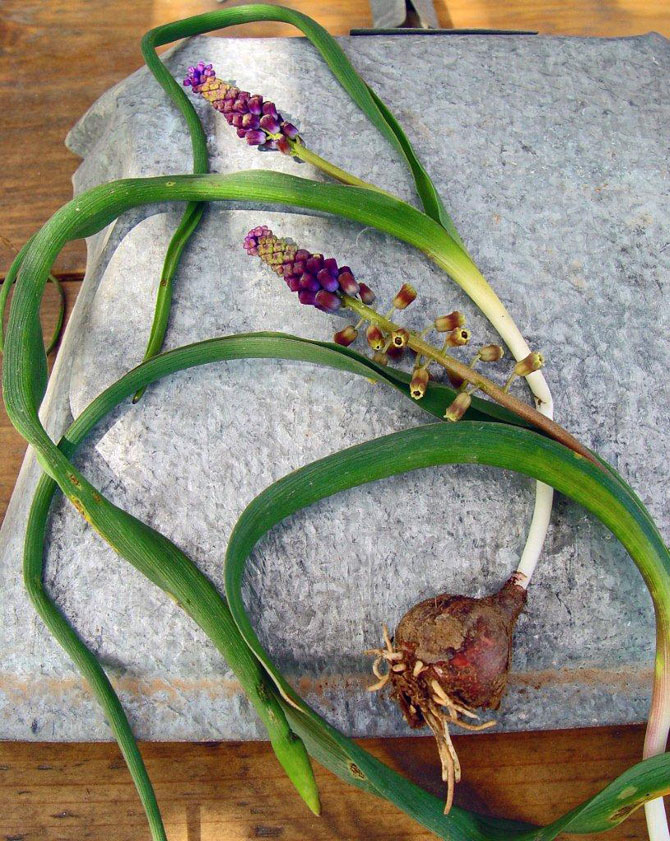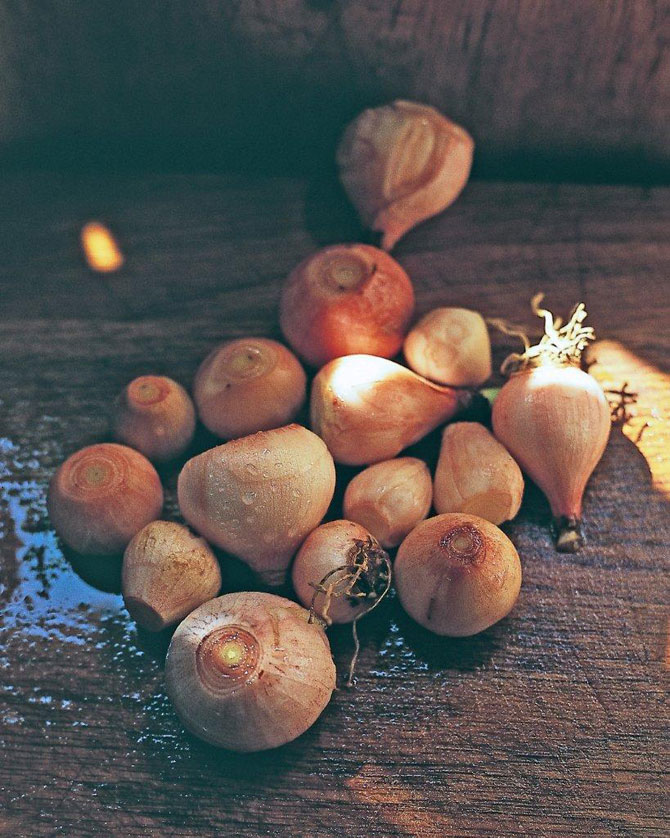“I wonder if you Greeks eat also the stuff that comes out of your ears…” exclaimed chef Rick Moonen as he spit out a piece of pickled volvos –wild grape hyacinth bulb (lampascioni in Italian). A dozen years ago I was asked to initiate Rick Moonen –then chef of Oceana— and Jim Botsacos into authentic Greek taste and home cooking when the Livanos family was preparing to launch Molyvos, in Manhattan. Rick is one of the most talented chefs I know, a really adventurous eater, but bitter seemed to be a taste he didn’t tolerate. He is not alone. Many Americans and Europeans have an almost violent reaction towards bitter foods. On the other hand we Greeks, together with the inhabitants of Italy, and especially Puglia–at the heel of the Italian ‘boot’—are somehow genetically conditioned to crave bitter: besides wild hyacinth bulbs, we also love red-stemmed chicory, probably the most bitter of the bitter greens, and fresh cracked green olives that have just become edible, after a very brief curing.

Healthy ‘poison’
Although in the old days bitter taste was associated with something poisonous and harmful, today scientists insist that the compounds that give bitter taste to some vegetables are the most beneficial for our health.Galatsides, another strain of the extended bitter chicory family, are among the most popular winter greens foraged in Kea. Early in the spring, locals search the gardens and hills for porichia, the shoots of a wild mustard green. Rare and delicious, with a slight bitter taste, porichia are blanched and served as salad, dressed with fruity olive oil and lemon. From my Kean grandfather I learned to drink the cooking water where the various wild greens are cooked. Ari Weinzweig’s potlikker reminded me of this deliciously bitter broth, which I keep in bottles in the fridge and drink warm or cold with a fair amount of lemon juice.

Although we enjoy savory bitter foods, this does not mean that Greeks like dark chocolate and plain black coffee. I have found that here, more than in other countries, men and women prefer milk chocolate, add a fair amount of sugar to their coffee, and Greek sweets, like the syrup-drenched baklavaor galatoboureko (custard pie), and even the Western-inspired cakes contain much more sugar than you would expect.
Ancient Aphrodisiac
Volvoi (plural of volvos, botanical name: Muscari comosum) are usually gathered from the wild, and were much praised by ancient Greeks who thought they were aphrodisiacs. In ancient texts I came across a description of a lentil soup complimented with wild grape hyacinth bulbs, and I tried it. I find it a truly wonderful combination, as the sweet and earthy lentils are perfectly balanced by the crunchy bitter volvoi. During the spring one can buy freshly dug tiny bulbs at the farmer’s markets in Athens, although now very few people decide to blanch, peel, cook and pickle them at home. They are available in jars in supermarkets, as they are traditionally part of the vegetarian Lenten table. Throughout the year they are served, as mezze with our strong, yet somewhat sweet drinks: tsipouro, ouzo, or raki.

In Crete, where one finds the most interesting dishes prepared with all sorts of foraged greens and roots, volvoi are fried in olive oil, and also cooked together with fresh fava and other vegetables in lemony spring stews. But it is in Puglia that lampascioni find their way in a great variety of dishes. Just searching the word in flickr I came across the most inviting dish of scrambled eggs with lampascioni and lots of other pictures of the bulbs, cooked and raw, as well as artistic shots of the pretty grape or tassel hyacinth flowers. I was surprised to see that European and American nurseries and seed catalogs sell different kinds of wild hyacinths as ornamental plants…

See the Recipe: Lentil Soup with Wild Hyacinth Bulbs, Garlic and Mint